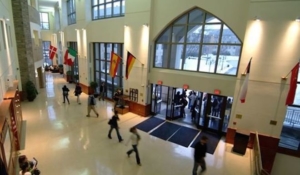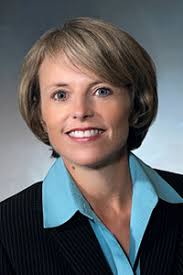KEY DIFFERENCES IN MARKETING RECRUITING
In other words, the key message that schools oftentimes struggle to get through to marketing students is that marketing recruiting is not the same as the ABC fields and, in fact, it’s going to look radically different. First, there’s the big push in the fall. Not only are banking and financial industries firms in a heated race for top talent, but they are aware of their talent needs well ahead of marketing firms or in-house marketing teams. But this isn’t the case in all industries.
“On our side at VSB (Villanova School of Business), it’s a challenge to communicate to students in marketing that while there’s a significant recruiting push in fall, there’s also one in the spring,” says Julie Pirsch, a Villanova marketing professor, associate dean of teaching and learning, and associate director of student initiatives. “That’s something that we have to tell them once, then tell them again, and tell them a third time because we’re competing with messaging from other majors where the timelines are earlier. So, yes, we spend a lot of time talking about it.”
Egan says the nature of the industry creates differences in the ability to forecast hiring.
“An example is within the advertising and PR arena,” Egan says. “Recruiting often happens in spring, not fall. Companies are not forecasting months in advance how many hires they’re going to need and they don’t have recruiting dollars and bandwidth to send teams on campus like you see in other industries.”
The second key difference is bulk hiring.
“For the most part in marketing, companies will come recruiting for one or two people versus a larger class for some of the other disciplines. In spring, they’re typically recruiting one to two hires per company.” Pirsch explains. “That’s how the industry operates as they’re hiring for need. An exception being some of the rotational programs in fall semester where they’re looking for five to ten hires. We do have multiple hires at one company, however, those class year hires tend to be smaller in number than one might find in other disciplines.”
Because of the lack of bulk hiring, marketing students are oftentimes at the mercy of networking and having to be much more savvy about growing and navigating their networks. Students Poets&Quants spoke with say they were heavily reliant on professors, alumni, and student organizations to navigate the landscape of marketing recruiting.
Wang, for instance, says she acquired her upcoming summer internship with Target thanks to a student organization she joined. “For me it was mainly finding clubs on campus and organizations that weren’t focused too much on consulting and banking,” she says. “I joined an entertainment club because I knew I wanted to go into retail or the entertainment industry. That was helpful to talk to and network with professionals not necessarily in tech or banking or consulting. I was able to network with somebody who worked at Target, they made an introduction for me, and that’s how I landed my internship role with them.”
BUSINESS SCHOOLS INVEST MORE TIME AND RESOURCES INTO MARKETING
Nevertheless, as students voice their anxieties and frustrations, schools are making good faith efforts to show students that they hear their concerns. UVA’s McIntire School formed an advisory council three years ago made up of marketing faculty and alumni plus career services staff to rally around the issues.
“One of our key initiatives has been a careers in marketing program which takes place in early fall,” Egan tells Poets&Quants. “When other industries are very loud and have a strong presence at UVA, we have this very key program. Last year we brought in 19 alums in senior level positions working at well-known companies and had a keynote speaker, breakout sessions, networking lunch, reception, alumni networking, and information on how to maximize chances of getting internships and full-time roles.”
UVA says it’s also invested time and resources into site visits similar to the I-Bank and Wall Street treks seen in finance and banking.
“During the winter break in January, we have a marketing trip where we take 20-25 students to NYC,” Egan says. “We visit alumni and industry partners representing a wide array of sectors. We visit big agencies, tech companies, retail companies. There’s also a promotions and advertising trip visiting 10 to 12 ad companies and agencies and a startups analytics trip — started two years ago — where students visit startups at various stages and well-established companies who hire our marketing analytics students. Finally, there’s a digital safari trip to San Francisco where we take students to visit big tech players in Silicon Valley in addition to startups.”
At Villanova where marketing is the third largest major behind finance and accounting, Pirsch says they’re combatting student angst by pumping out information to marketing students on a weekly basis via an internal program called MarketU.
“On a weekly basis we communicate with them via newsletter, there’s a job of the week, internship of the week, articles from industry press,” Pirsch says. “The newsletters are a little snarky and meant to be very conversant, not wonky business. Really, we just kind of continue to put opportunities in front of students on a consistent basis and keep them engaged to help counter any messaging that’s out there.”
Pirsch points out there are also events that cater to students in each class year.
“Specific events for marketing majors who are juniors, seniors, freshmen, etc. to coach them on how to seek out and secure internship opportunities,” she says. “For sophomores, for instance, it’s educating them on different pathways to pursue in marketing. For juniors and seniors, it’s about how to seek out and develop opportunities for internships and jobs.”
STUDENTS TAKE NOTICE
Students agree that the efforts aren’t unnoticed and make a difference in lessening the apprehension they may be experiencing.
“I’m a part of dean’s student council and something we’ve seen is career services starting to put on more events specifically for us,” says Maryland’s Gomez. “Management and marketing industry night, for instance, where professionals talk to us about what they’re doing. It helps people clarify where they want to go and help clarify what marketing really is.”
Haas’ Wang shares, “I think the best resource as of right now has definitely been my professors because I was able to gain a lot of confidence from them. I went to them with my anxiety about not pursuing consulting. They talked me through it and helped me see that marketing is a really great area to pursue. The second thing is watching out for every event that Haas sends out. Haas is now doing a better job diversifying the types of companies who come here.”
Guo at UVA says the resource that’s been most memorable for her is a marketing symposium put on by the school’s career services office. “It was an event where you rotate through different rooms with several speakers that represented a specific focus within marketing, sales, advertising, brand management, etc,” Guo says. “You get to sit and listen to alumni in those fields speak about what they do. This was helpful for me to figure out what specific path I wanted to take. Especially earlier on when I didn’t know what, within marketing, I wanted to do.”
IN THE END, STUDENTS WIN
Despite the nervousness that marketing students may experience, schools say ultimately it mostly works out. Destination data at the majority of top business schools shows high placement rates across all majors, which would include marketing students.
“For the Class of 2017, 98% of our Bachelor of Commerce students were employed as of December of 2017,” Egan says. “Also, the average base salary for marketing students in 2017 was $56,346 which is well above the national average, I think.”
At Villanova, Pirsch shares that 99% of the school’s graduates are employed within six months of graduation.
DON’T MISS: THE BEST COMPANIES FOR RECENT GRADS or SEVEN THINGS TO DO RIGHT NOW IF YOU WANT A SUMMER INTERNSHIP













Questions about this article? Email us or leave a comment below.